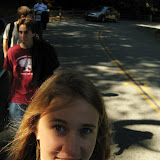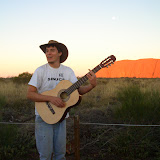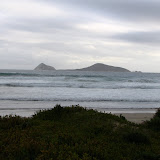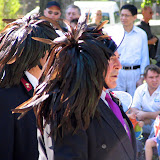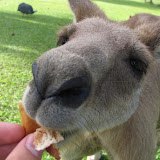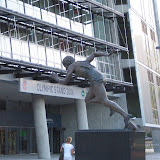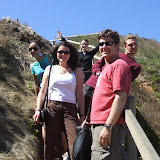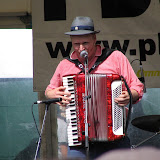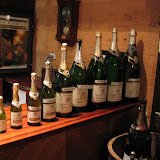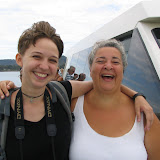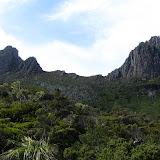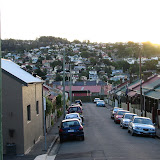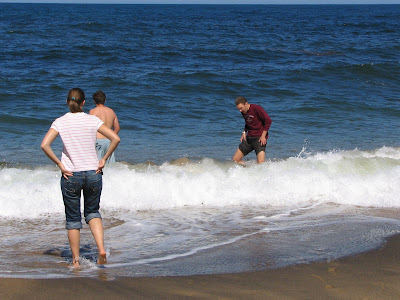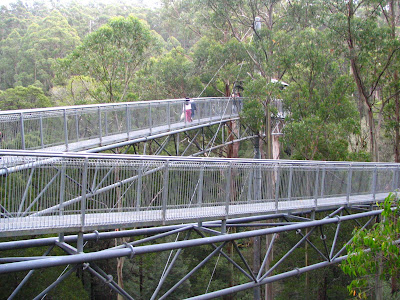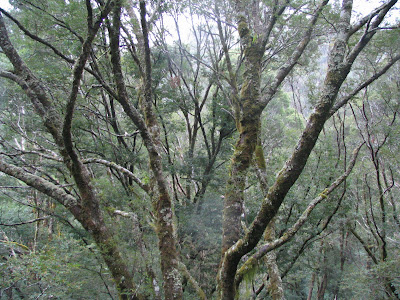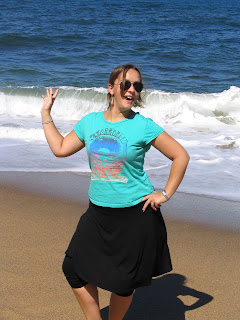Tuesday, March 27, 2007
My Blog is More Modern than Yours
First clip was taken at the Grampians National Park, which is this mountain range I stayed at for three days with my Introduction to Australian Society class. I've uploaded the pictures from the trip but didn't blog it. Anyway, these were some rowdy Kangaroos nearby our camp.
Not that we didn't spend the extended weekend broadening our horizons and learning, but those situations just aren't as entertaining. One afternoon we tried out the overgrown swing set by the camp, and I screamed like a girl, again.
CRUDE HUMOR ALERT (Fair warning): Next, a boating trip on the Yarra river as part of Marine Biology class. (Nothing like Cornell classes! But we were taking water samples every twenty minutes. Torture!) This video features a little crude humor as a classmate shows me a new way to use my middle finger while our professor knocks the boat out of gear. I think he knew I was filming. I apologize for my laugh.
These other videos are from the FINA diving competition I went to last weekend. This was part of an international swimming competition hosted in Melbourne. There was distance swimming (25km on St. Kilda beach, where I've swam a few times before), probably lap swimming, water polo, diving, maybe other events. This first clip is of US diver K. Bryant on the 3m springboard. Unfortunately, she was one of only two Americans female divers to make it to the semifinals (18 divers). None of the American men made it that far. Scored by 7 judges on a score of 0 (worst) to 10 (best).
The Chinese divers beat the competition for both sexes. Here are a couple.
It was undoubtedly more entertaining watching the men dive, because they used 10m platforms instead of the 3m springboards. Pretty difficult though, and this guy's timing is just slightly off when he enters the water. He got mostly 4s, as I remember.
As if a 10m platform isn't intimidating enough, the guys also had to dive out of a handstand for at least one of their six dives. I would have been dribbling out my speedo.
And that's all for now! More fun stuff later.
Interesting Australia news
Recently there's been a severe drought in Australia, forcing Victoria to consider recycling water (i.e. sewage treatment). Currently recycled water is used only for agriculture and gardening, and although it's chemically cleaner than other public water, there's always the psychological factor that makes it undesirable. Wool production expected to fall 20-25% as result of the drought. The government has provided interim financial drought assistance to pastoralists in central Australia.
David Hicks is periodically in the news, and not because he won American Idol (that was Taylor...I've been told). He's been an Australian Guantanamo detainee since 2004, much to the ire of Australian citizens who have grown increasingly hostile toward Australia's support of the Iraq war. His trial may have been expedited due to Australian PM John Howard's pressure. The most recent news, however, is that David Hicks has pleaded guilty to a terrorism charge of material support. I imagine this will be on the front news in all Australian newspapers.
Meanwhile John Howard has grown increasingly unpopular in the polls. While he is from the "Liberal Party," his politics are quite conservative, though he has been a staunch supporter for US President Bush. It is much more common to hear Australians publicly complaining about their politicians than it is in the US.
And, naturally the most important Australian news, I will be going to the Great Barrier Reef next week. Need to plan for it, though! Later gators.
Tuesday, March 20, 2007
Great Ocean Road
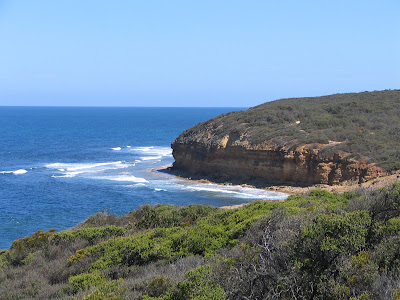
This section of

We jumped out of the car at the first beach we spotted, did the tourist thing taking pictures, and contemplated swimming. There was no lifeguard on duty, and one ominous yellow sign warned of currents, sharp underwater ledges, and a couple other synonyms for certain death. I decided to only wade in, remembering the ocean currents in
Another highlight was the
Finally saw some koalas too! These overblown beanie babies sleep for 19 hours a day, partly because the gum tree leaves they ingest are toxic and need to slowly be digested.
Then to
At
…and the weekend was over before we knew it. We had some great times, helped by the fact that we were all pretty low key. If the weather had been better on Sunday and Monday we might have gone surfing (only $36USD for board, wetsuit, and instruction!!!!), but sadly I was outvoted. No matter, I went surfing with RMIT this past Saturday. No pictures of that, but I swear I stood up at least five times. Getting there.
Monday, March 5, 2007
East Coast tour, Day 1
 The Adventure Tours bus picked me up from the Devonport hostel at
The Adventure Tours bus picked me up from the Devonport hostel at  As the bus drove along, I spoke with John the Brit about the Australian Open, and how I would have loved to have been in
As the bus drove along, I spoke with John the Brit about the Australian Open, and how I would have loved to have been in
I spent more of my time with Angela and Verina, two of the Germans, Danni, the French fry, and Maha, the Swiss Miss. The first three were right around my age, and Danni was only eighteen, the youngest by a few years. She had already received her diploma, but was taking half a year off before university to travel and volunteer around the world. Verina had a thick Berlin accent (she told me, I don’t know these things. All I know is she reminded me of Frau Blücher from Young Frankenstein.) She and Danni became close friends.
Angela was a bit of a German punk with plenty of substantive things to say, and she filled me in on recent Neo-Nazi activity.

“…and two Nazis were elected into government a few years ago. None of the other politicians want anything to do with them, naturally. And the two weren’t able to do much, since they didn’t agree with each other much. And one was busted for child pornography. So support for the Neo-Nazis has ebbed a bit recently.” Good to know, Angela.
Maha, the Swiss Miss, was actually a good deal older than the rest of us—at least thirty-five. Her father had died and left her with enough money to quit her job as a career advisor and take some time off to travel. She’s using this time to identify her dream profession.

 First stop was the recently harvested Bridestowe Lavender Farm selling lavender chocolate, honey, and basically everything else you can imagine, and then some. I managed not to buy anything, but Frank the Brit bought some lavender oil, which he mixes with some other oils to concoct a muscle relaxant, pain reliever, perhaps a wrinkle remover, or nectar of the gods, or elixir of life. He explained this all to Verina and me, but I was busy taking pictures.
First stop was the recently harvested Bridestowe Lavender Farm selling lavender chocolate, honey, and basically everything else you can imagine, and then some. I managed not to buy anything, but Frank the Brit bought some lavender oil, which he mixes with some other oils to concoct a muscle relaxant, pain reliever, perhaps a wrinkle remover, or nectar of the gods, or elixir of life. He explained this all to Verina and me, but I was busy taking pictures.We then visited a WWI memorial dedicated to ANZAC troops (Australian and New Zealand Army Corps) in the middle of some small town. Originally some trees (elm?) had been planted along the town's main road to commemorate its fallen soldiers. As the trees aged their limbs became too heavy to support, and they had to be cut down for safety reasons. It took one man six months to finish cutting the trees with his chainsaw. But the final result was worth it.

My camera memory was pretty full of pictures, so at the next town we stopped at I hurried off to get them transferred to a CD. I found a store to do it, but the process was slow that I kept the bus waiting fifteen minutes. At that point I just gave up on the whole thing and asked a very confused employee to just mail the CD to me. I got on the bus and apologized to everyone, and decided I would try not to do anything stupid for the rest of the day.

A quick hike through streams and ferns until some waterfall.

Then a pit stop at some beach. Bruce, our guide, cook, and driver, told us to watch out for the current. He didn't know I was lifeguard and therefore Master of the Aquatic Universe, so I didn't pay much attention. A minute later I was in a remarkably strong current that was pushing me further down the beach, and right toward some barnacled boulders. Oops. I decided to listen to Bruce from then on, and helped out with dinner that evening.
Sunday, March 4, 2007
Celebrating Schirrmann
I was eating dinner in Devonport with a couple of my Australian hostel mates, Leonard and Mildred (real names forgotten). They were an elderly couple that probably lived a combined 160 years. I had been introduced to them by John, a spring chicken at 72. I was bothered by all the old people in my hostel.
“Does
